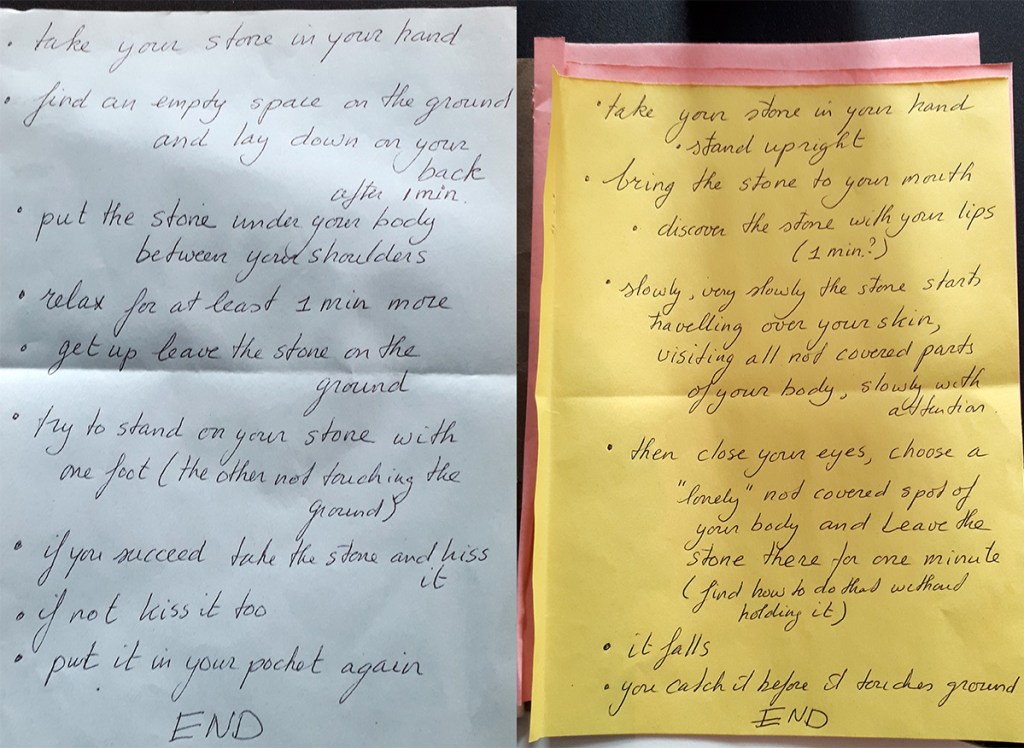Let’s start with an invitation. Please read Alcho: An online experiment of Performing Alchorithms, and if you are interested in evolving protocols as a way to share processes contact Annie Abrahams for a private Alcho performance session.
Through Alcho Abrahams asks: “Is it possible to create an algorithm that includes human behaviour, that evolves over time and in the process integrates aspects of the personalities of all the participating individuals? Because there are humans involved she thinks the project will probably turn out to be an erratic, iterative, evolving, experiential happening. Abrahams is interested in the written traces; in the instruction sets, as markers of the evolving Alcho processed through humans by writing and performing.”
And then let’s try to explain where the project comes from.
An Alchorithm is:
- A song from 2011 by a Japanese hard rock group called “Awkward Hure”.
- A process or set of rules to be followed in order to decide whether another drink is applicable. The alchorithm can only be used by those that are drunk.
- Alchorisma + algorithm Abbreviation: alcho
Algorithm = a process or set of rules to be followed in calculations or other problem-solving operations, especially by a computer.
Alchorisma = The theme of a work-session organised by Z33 and Constant. 2-8 December 2018, Z33, Hasselt, Belgium.
Alchorisma alludes to the relationships between algorithms, charisma, rhythm, alchemy and karma. It looks at integrating cosmogenetic views with the charisma surrounding technology, at ways to infect existing algorithmic models with ideologies that acknowledge the importance of co-existence with non-human entities.
Alchorisma is also the online platform with ideas, prototypes, reflexions as these evolved over time between 2018 and 2021. When visiting the publication an algorithm determines the links on the pages and makes you wander through the website on different pathways every time you go there.
Intrigued, Annie Abrahams applied for the first work-session.
Although very suspicious of alchemy and karma, she wanted to open herself to other than failing rational and artistic approaches of eco-technological issues.
It kind of worked. Abrahams wrote afterwards: “a spirit is not a thing, nor is it of the imagination, it’s all encompassing, everywhere, it relates things, trees, humans, stones and whatever … it is a consciousness of entanglement, of interdependence – if you experience it, everything becomes related and I, Annie, can call this feeling by touching beautiful old “dying” trees.”
She also thought that the work-session could be an occasion to think about the relation between protocols used for optimization and the way she uses protocols in her performance practice; her’s don’t determine outcome, but rule behaviour, giving it constraints, while leaving complete freedom for interpretation.

During the Alchorisma work-session RYBN and Abrahams developed and tested a first Alcho: an algorithm that includes human behaviour, which evolves over time and in the process integrates aspects of the personalities of all the participating individuals. They determined variables and used instruction and meta-instruction sets with the objective to propagate a performance from one person to the next.
The development was based on a simple flowchart of an iterative process and German dancers Deufert and Plischke’s methodology for shared performance writing through transmission and reformulation, which in itself is an adaption of the game of consequences for the production of movement descriptions.
It looked easy to modelize the iterative process of the Alcho but turned out to be time consuming. Here is the first alchorithm (Alcho) written by Annie Abrahams and RYBN. A second alchorithm and details on the developing process can be found in the Alchorisma publication.

After starting the implementation the experimenters noticed that they forgot some essential elements. For instance they did not think of a surveillance system and so soon lost track of what was happening. Moreover, in the optimisation of the alchorithm they had left out an intention to have the performance transformed through the subjectivity and interpretation of the writer AND the performer.
“It was shocking and amazing that in our happiness at succeeding in making something that could work, we had quite naturally left out essential relational and qualitative elements.” Abrahams wrote in her report on the process.


So the experiment wasn’t a frank success, but it wasn’t without results. It continued to travel. Abrahams stayed intrigued in evolving protocols as a way to share processes and so when the time was ripe proposed an online version that you are invited to join in.
